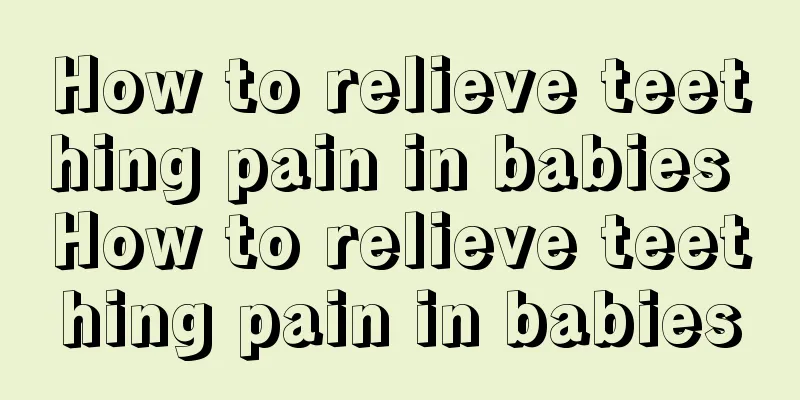How to relieve teething pain in babies How to relieve teething pain in babies

|
Babies will slowly grow their first teeth around six months old. During the teething stage, babies will feel discomfort in their mouths, which is a normal physiological reaction. If parents find that their babies are repeatedly troubled by teething, they should think of some ways to relieve the discomfort of teething. Here are some tips for you. Teething symptoms in babies1. Drooling. When the baby is 6 to 7 months old, the deciduous teeth begin to erupt, stimulating the trigeminal nerve and increasing the amount of saliva secretion. In addition, the baby's oral cavity has a small capacity and cannot swallow or regulate the saliva in the mouth, which causes drooling. Countermeasures: Pay attention to the baby's personal hygiene and wipe off the saliva in time with a clean and soft handkerchief or tissue. Change and wash the collar and lapels frequently. Protect the baby's mandibular and chest skin with a clean gauze or bib. 2. Red cheeks or red spots. Most of the time, it is due to the contact of saliva with the skin of the cheeks, jaw, neck, and chest, resulting in a slightly swollen red rash. Countermeasures: Once the baby is found drooling, wipe it off in time to keep the local skin clean and dry. Change handkerchiefs frequently to minimize the contact of saliva with the skin of the cheeks, chest, etc. 3. Gum swelling, pain or itching. Every child will experience a period of pain during teething, usually with symptoms such as toothache, itchy teeth, and a craving for chewing. Because the eruption of teeth stimulates the gum nerves, the baby's gums will feel these discomforts. Countermeasures: The mother washes her hands and gently massages the baby's gums with one finger, which is very effective in relieving pain. 4. Crying and having a bad temper. It is normal for babies to be irritable when teething. Of course, we should first rule out calcium deficiency in babies, because calcium deficiency can also cause irritability and restlessness. It is best to take the baby to the hospital to check for trace elements. Countermeasures: If babies cry and have a bad temper during teething, parents should gently comfort them, spend more time playing with them, and let them focus on the game to distract their attention and reduce anxiety. 5. Uneasy sleep. The teething period will indeed make the heart hot. If the weather is hot, the body will be hot and easily get angry, and the mood will be irritable, so it is natural to sleep uneasy. Some emotional fluctuations before and after teething are generally normal. Countermeasures: The only way to relieve the baby's teeth is to wait for the baby's teeth to grow smoothly. At night, adults should accompany the baby to sleep, touch the baby's little hands, pat the back, let him calm down, and sleep more peacefully. 6. Fever and diarrhea. Some babies will have more fevers when they are teething, but this is not absolute. Teething itself does not cause fever. This is mainly because during the teething stage, the baby's gums will itch and they like to bite things. If they bite unclean things, they may cause throat or gastrointestinal infections, causing fever or diarrhea. Some babies may also have gastrointestinal reactions due to changes in the nature and quantity of saliva, causing vomiting and mild diarrhea. Countermeasures: You can give your baby more warm water and eat more vegetables and fruits. Because the baby's gastrointestinal function is poorly regulated, once the feeding method changes and is attacked by bacteria, it is easy to induce diarrhea. If the baby has a fever or diarrhea, it is recommended to further check and confirm the cause of the diarrhea before symptomatic treatment. How to relieve baby's teething painSome mothers find that rubbing their fingers over the sore gums can temporarily numb the pain. Giving your baby something to chew on can have a similar effect, as it relieves pressure and thus pain. Your baby may also find something to chew on himself, and may find hard, unsweetened rusks, teethers or peeled raw carrots helpful, but be careful not to give your baby carrots after his first tooth comes in, as he may choke on a chunk. Cold things are particularly soothing, so keep teethers in the refrigerator or give your baby a semi-frozen wet washcloth to chew on. Water frozen in a bottle or cup can also help soothe gums, and if your baby is old enough to eat solid foods, give him some cold applesauce or plain yogurt. But sometimes, if your baby won't eat these things, the best therapy you can offer may be a good cuddle. Misconceptions about baby teethingMyth 1: If a breastfed baby bites his mother when teeth grow, he should be weaned. In fact, after babies grow teeth, they will learn to suck milk by latching on, so they won't bite their mothers. If babies accidentally bite their mothers' nipples when they first start to grow teeth because they are not used to the function of teeth, then mothers can use exaggerated tones and actions to let their babies know that this is wrong. Although babies are small, they are actually very smart. They can understand what their mothers want to express by observing their mothers' expressions and tones. After a few times, babies will gradually know that they cannot bite when feeding, but should suck instead. Myth 2: If your child’s gums are swollen, you should see a doctor immediately In the first few weeks of tooth eruption, there may be a circle of purple-blue ridges on the gums, which is medically called "tooth eruption hematoma". Usually it will slowly subside after the tooth erupts, and it usually occurs in the growth area of the second deciduous molars or first molars, but it does not require special treatment, so parents should not worry. Myth 3: It is inconvenient for babies to brush their teeth, so you can use mouthwash instead. In fact, it depends on the type of food! If it is sticky food, such as soft candy, chocolate, biscuits, cakes, etc., rinsing the mouth alone will not remove the residue, and you must brush your teeth. If you eat fruit and vegetable foods such as apples and oranges, rinsing the mouth can barely replace brushing. Myth 4: If children don’t like to drink water, they can use juice instead of water Some children don't like to drink water, so parents add diluted fresh fruit juice to the kettle to make them drink water. In fact, even diluted fruit juice still contains a lot of sugar, which can cause tooth decay in children. In addition, if you drink fruit juice at any time, it is as dangerous as soaking your child's teeth in sugar water for a long time, which will keep your child's teeth in an environment prone to tooth decay, and the chance of tooth decay will increase sharply! |
<<: How to train your baby's grasping ability when he can't grasp things
Recommend
What country's brand is Super Power Laundry Detergent? How is Super Power Laundry Detergent?
Laundry detergent is a very important cleaning pr...
Is it necessary to buy an electric toothbrush? What are the types of electric toothbrushes?
Children can also use electric toothbrushes, but ...
What should pregnant women eat to maintain a healthy pregnancy? Pregnant women's diet
The early stage of pregnancy is a critical period...
Is it useful for babies to eat DHA when they speak late? The key period for babies to supplement DHA
Many mothers like to give their babies various ca...
How long should an electric blanket be turned on? Is it normal for an electric blanket to have a smell?
When buying an electric blanket, you must choose ...
Can I drink goat milk powder every day? Is it bad to drink goat milk for a long time?
Goat milk powder is a very common product on the ...
The correct way to use Kao softener. Which Kao softener smells good?
Putting some softener in the laundry can make the...
Does a child look like his father or mother? Genetics explains how children inherit their appearance
Some parents will study which parent their baby l...
Why does the stool smell bad if the baby is breastfed? Protein indigestion
Sometimes babies who drink only breast milk will ...
Moms should pay attention to scientific preparation for pregnancy. Girlfriends' experience is not entirely correct.
Preparing for pregnancy is a big deal for both hu...
What is a pregnancy soup? What are the ingredients of a pregnancy soup?
Have you ever heard of preparing for pregnancy? D...
What should I do if the due date has passed? Why does a pregnant woman have a hard belly?
Pregnant women have special physical conditions, ...
Can children use Sanfutie? How old should a child be to use Sanfutie?
During the hot summer, many hospitals or health c...
How to correct children's picky eating habits? What should we do if children are picky eaters?
Nowadays every child is the baby of the family. O...
How much does folic acid cost? Which brand of folic acid is better?
Pregnant women need to supplement folic acid in t...









